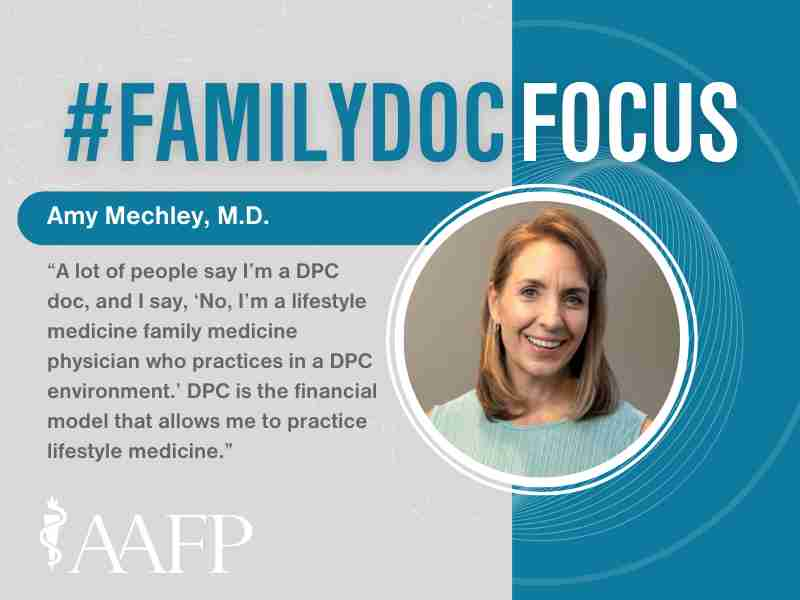Merging Lifestyle Medicine With DPC Is Key for FP
March 21, 2023, David Mitchell — Amy Mechley, M.D., spent years trying to find the practice model that would allow her to build and sustain the kind of relationships she wanted with her patients.

She helped her family medicine practice in Cincinnati achieve Level 3 patient-centered medical home recognition from the National Committee for Quality Assurance in 2010. A few years later, she was a medical director for a health network with more than 100 locations when it participated in the Comprehensive Primary Care Initiative. That four-year CMS national demonstration project sought to strengthen primary care by supporting primary care practices with monthly care management fees and Medicare shared savings in addition to fee-for-service payments.
Mechley, who earned a design innovation certificate from Xavier University in 2015 while she was involved in the CMS project, began serving as an advisor for the Ohio Governor’s Office of Health Transformation that same year.
Ultimately, none of the practice transformation work resulted in a model that fully met her expectations.
“I realized there was something still missing,” she said, “and it was that relationship-based medicine between the patient and the doctor that required time to sit and talk about the actual root cause of what was happening.”
Mechley said a Harvard Medical School course on mind/body medicine in the summer of 2008 eventually led her to an interest in lifestyle medicine, which uses lifestyle interventions as a primary modality to treat chronic conditions. It emphasizes a plant-based diet, exercise, restorative sleep, stress management, avoidance of risky substances and positive social connections.
By 2012, Mechley was giving grand rounds on lifestyle medicine at her hospital. By 2014 she was speaking about it at national conferences, and a year later her work on the topic was published in a national journal.
The question for Mechley was how to make lifestyle medicine work for her and her patients. After years of research and planning, she launched her own direct primary care practice in 2017 in Cincinnati.
“A lot of people say I’m a DPC doc, and I say, ‘No, I’m a lifestyle medicine family medicine physician who practices in a DPC environment,’” she said. “DPC is the financial model that allows me to practice lifestyle medicine.”
Mechley had a panel of more than 3,000 patients at her former practice. She said she needed to see 28 patients a day to break even in the fee-for-service model. In DPC, she sees roughly 10 patients a day in person and cares for another 10 to 15 via telehealth. Her panel is about 450 patients.
She said that practicing lifestyle medicine in the DPC model has been good for her and her patients because it gives her more time with individual patients and the flexibility to follow the tenets of lifestyle medicine herself, including getting the adequate rest and exercise needed to be her “most empathetic, compassionate self.”
“It really allows me to also care for myself,” she said, “so, when I show up, I am a better human being who can listen to my patients.”
Mechley, who is board certified in both family medicine and lifestyle medicine, will share her passions for lifestyle medicine and direct primary care during two upcoming AAFP events. She will be faculty for the Academy’s Physician Health & Well-being Conference April 25-28 in Indian Wells, Calif. She also will present during the AAFP’s Lifestyle Medicine Live Course May 17-19 in Albuquerque, N.M.
Mechley, who has served on the Board of Directors for the American Board of Lifestyle Medicine since 2021 and is its chair this year, co-chairs the AAFP lifestyle medicine course with Elizabeth Polk, M.D., who is faculty at the Carilion Clinic Family Medicine Residency in Roanoke, Va.; and Brenda Rea, M.D., Dr.PH., P.T., R.D., program director of the Loma Linda University Health Education Consortium Family and Preventive Medicine Residency Program and Lifestyle Medicine Intensivist Fellowship.
“They’re both all-stars,” Mechley said. “We created the course from scratch. We designed it for the family medicine doc learner as lifestyle medicine 101. It’s understanding the knowledge, but also offering very practical information about how to start doing lifestyle medicine inside of a family medicine practice, and we take into account that doctors are coming from different models.”
Mechley, who is CEO of TRI-DPC, a network of six independent DPC practices that together care for employees from small to medium-size businesses, will present on DPC and culinary medicine at the Physician Well-being conference.
“I speak about the DPC model for the docs who are interested because I really believe it’s the best thing that’s ever happened for physician well-being, to practice in a healthy model so we can actually be attuned to our deeper sense of mission and purpose,” she said. “In the culinary course I speak about food as medicine and how to prepare food for yourself easily because we’re all really busy. We also then learn how to talk about it with our patients.”